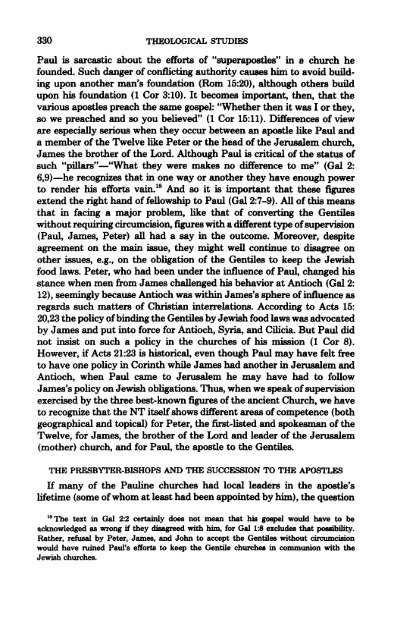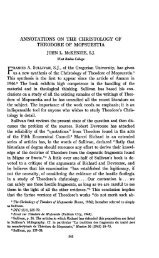episkopë and episkopos: the new testament evidence - Theological ...
episkopë and episkopos: the new testament evidence - Theological ...
episkopë and episkopos: the new testament evidence - Theological ...
You also want an ePaper? Increase the reach of your titles
YUMPU automatically turns print PDFs into web optimized ePapers that Google loves.
330 THEOLOGICAL STUDIES<br />
Paul is sarcastic about <strong>the</strong> efforts of "superapostles" in a church he<br />
founded. Such danger of conflicting authority causes him to avoid building<br />
upon ano<strong>the</strong>r man's foundation (Rom 15:20), although o<strong>the</strong>rs build<br />
upon his foundation (1 Cor 3:10). It becomes important, <strong>the</strong>n, that <strong>the</strong><br />
various apostles preach <strong>the</strong> same gospel: "Whe<strong>the</strong>r <strong>the</strong>n it was I or <strong>the</strong>y,<br />
so we preached <strong>and</strong> so you believed" (1 Cor 15:11). Differences of view<br />
are especially serious when <strong>the</strong>y occur between an apostle like Paul <strong>and</strong><br />
a member of <strong>the</strong> Twelve like Peter or <strong>the</strong> head of <strong>the</strong> Jerusalem church,<br />
James <strong>the</strong> bro<strong>the</strong>r of <strong>the</strong> Lord. Although Paul is critical of <strong>the</strong> status of<br />
such "pillars"—"What <strong>the</strong>y were makes no difference to me" (Gal 2:<br />
6,9)—he recognizes that in one way or ano<strong>the</strong>r <strong>the</strong>y have enough power<br />
to render his efforts vain. 18 And so it is important that <strong>the</strong>se figures<br />
extend <strong>the</strong> right h<strong>and</strong> of fellowship to Paul (Gal 2:7-9). All of this means<br />
that in facing a major problem, like that of converting <strong>the</strong> Gentiles<br />
without requiring circumcision, figureswith a different type of supervision<br />
(Paul, James, Peter) all had a say in <strong>the</strong> outcome. Moreover, despite<br />
agreement on <strong>the</strong> main issue, <strong>the</strong>y might well continue to disagree on<br />
o<strong>the</strong>r issues, e.g., on <strong>the</strong> obligation of <strong>the</strong> Gentiles to keep <strong>the</strong> Jewish<br />
food laws. Peter, who had been under <strong>the</strong> influence of Paul, changed his<br />
stance when men from James challenged his behavior at Antioch (Gal 2:<br />
12), seemingly because Antioch was within James's sphere of influence as<br />
regards such matters of Christian interrelations. According to Acts 15:<br />
20,23 <strong>the</strong> policy of binding <strong>the</strong> Gentiles by Jewish food laws was advocated<br />
by James <strong>and</strong> put into force for Antioch, Syria, <strong>and</strong> Ciucia. But Paul did<br />
not insist on such a policy in <strong>the</strong> churches of his mission (1 Cor 8).<br />
However, if Acts 21:23 is historical, even though Paul may have felt free<br />
to have one policy in Corinth while James had ano<strong>the</strong>r in Jerusalem <strong>and</strong><br />
Antioch, when Paul came to Jerusalem he may have had to follow<br />
James's policy on Jewish obligations. Thus, when we speak of supervision<br />
exercised by <strong>the</strong> three best-known figuresof <strong>the</strong> ancient Church, we have<br />
to recognize that <strong>the</strong> NT itself shows different areas of competence (both<br />
geographical <strong>and</strong> topical) for Peter, <strong>the</strong> first-listed<strong>and</strong> spokesman of <strong>the</strong><br />
Twelve, for James, <strong>the</strong> bro<strong>the</strong>r of <strong>the</strong> Lord <strong>and</strong> leader of <strong>the</strong> Jerusalem<br />
(mo<strong>the</strong>r) church, <strong>and</strong> for Paul, <strong>the</strong> apostle to <strong>the</strong> Gentiles.<br />
THE PRESBYTER-BISHOPS AND THE SUCCESSION TO THE APOSTLES<br />
If many of <strong>the</strong> Pauline churches had local leaders in <strong>the</strong> apostle's<br />
lifetime (some of whom at least had been appointed by him), <strong>the</strong> question<br />
18 The text in Gal 2:2 certainly does not mean that his gospel would have to be<br />
acknowledged as wrong if <strong>the</strong>y disagreed with him, for Gal 1:8 excludes that possibility.<br />
Ra<strong>the</strong>r, refusal by Peter, James, <strong>and</strong> John to accept <strong>the</strong> Gentiles without circumcision<br />
would have ruined Paul's efforts to keep <strong>the</strong> Gentile churches in communion with <strong>the</strong><br />
Jewish churches.
















